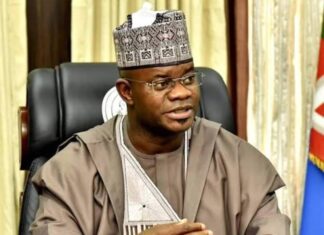The untold story why the army boys struck in 1966: Nigeria will continue to make motions without movement and stumble from one major crisis to another until the spirits of murdered Ndigbo are appeased in two ways: an unreserved apology by whoever happens to be President on behalf of Nigerians and a penitent nation to Ndigbo; and payment of appropriate reparations to the living relatives of those whose destinies were abrogated and /or had their properties confiscated in the present-day Rivers State under the façade of a highly preposterous and reprehensible “Abandoned Property” government policy.
By Tiko Okoye
Like every other human being, Senate Minority Whip Sen. Enyinnaya Abaribe isn’t perfect. He has his foibles and made a fair share of unforced errors. But since this piece isn’t about him, suffice to say he’s a well-respected street smart politician and one of the finest that ever sat in the hallowed Upper Chamber. He reminds me so very much of the charismatic and eclectic Second Republic Sen. Victor Akan (NPN-Oron).
In an interview published by the Daily Independent, Sen. Abaribe bared his mind on the controversies trailing the alleged budget padding and attendant suspension of Sen. Abdul Ningi. A lot has already been written and said about the specifics and the details of what exactly happened but I was absolutely riveted by an excerpt of the interview.
Daily Independent: Sen. Opeyemi Bamidele was saying that (Ningi’s allegation and rush to the press) was part of a subterranean ground attempt to unseat Sen. Godswill Akpabio as (Senate) President; do you see a case to that?
Sen. Abaribe: On the subterranean move, I can say that for Sen. Opeyemi, there is an Igbo adage that says that a palm wine tapper does not say everything he sees on top of the palm tree. There are always subterranean moves in every gathering and sometimes you may just leave it and sometimes you may have to make it open. I think (Sen. Bamidele) decided to bring it out so that everybody can rest. No system can stay without having resentment and so forth. It is normal in our political system.
The last sentence in the foregoing excerpt got me thinking real hard. As I went down the memory lane right from the period of the struggle for independence by the nationalists to flag independence, the January 15, 1966 military coup and the maltreatment of Ndigbo within the Nigerian Project, it’s as plain as daylight for all to see: an orchestrated Igbophobia that has continually spun subterranean moves and an admixture of resentment, fear, envy, jealousy and hatred against Ndigbo. It’s my hope that bringing it out would enable everybody to rest.
The government of the First Republic was based on a federal variant of the Westminster parliamentary system, with a Nigerian Prime Minister as the Head of Government and the British monarch as titular Head of State, until the country became a republic in October 1963. The country was split into three distinctive geopolitical spheres, each headed by a Premier. A fourth, the Midwest Region, was created in 1964.
The creation of the Midwest was essentially a ‘joint subterranean move’ against the Obafemi Awolowo-led Action Group in the Western Region by the Northern People’s Congress (NPC) led by Ahmadu Bello and the National Council of Nigeria and the Cameroons (NCNC), later rechristened National Council of Nigerian Citizens to conform with the popular acronym) led by Nnamdi Azikiwe, as payback for the opposition party chieftain’s equally dogged but futile ‘subterranean move’ to carve out a Cross River-Ogoja-Rivers (COR) Region from the Eastern Region.
Towards the ending of the colonial era, a ‘subterranean move’ was made by the South to follow Ghana’s example and table a motion for independence in 1958, even when the North was ill-prepared. Not surprisingly, the NPC correctly deciphered that it was a gambit by the more cosmopolitan and educated Southerners to subject the North to a servile existence considering the wide gulf in their respective human development indices.
That’s why it’s rather ironic to hear the Middle Belt people whining about how they’re being marginalised by “the Hausa/Fulani oligarchy.” As a matter of fact, as soon as the regionalisation policy took effect, Northern leaders retained the services of expatriates because they were regarded as transients but greatly feared the possibility of a regional civil service being dominated by Southerners.
It was this palpable fear and the policy of strictly limiting the recruitment of Southerners into the Northern regional service that opened up vistas of opportunity for Middle Beltans by way of university admissions, scholarships, technical jobs and an astonishing preponderance in all ranks of the Nigeria Army. The NPC also made it a top priority to secure Northern representation in senior positions of the Federal service – and no prize for correctly guessing which segment of the North profited the most from the ensuing Apartheid-like recruitment policy.
And despite the fact that no top military officer from the Middle Belt was killed in the 1966 coup, they were the ones – and Christians at that! – who chose to weep louder than the bereaved, did the unsolicited bidding of their benefactors by ensuring that the number of defenceless Nigerians of Igbo extraction massacred in Benue and Plateau Provinces exceeded the combined number nationwide! They shouldn’t expect to eat their cake and still have it.
The 1959 national election was clearly won by the NPC, contrary to opinions then circulating in the South. How couldn’t they have won when, thanks to their chicanery, the colonialists conducted a census on the eve of their exit that saw the Northern Region inexplicably gaining more seats in the parliament than both Eastern and Western regions combined! This was a ‘subterranean move’ that would cement Northern dominance in Nigerian politics till date.
Another ‘subterranean move’ came when the leader of the NPC with the majority in the Parliament, Ahmadu Bello, opted to become the Premier of the North, despatching his deputy to Lagos to assume the office of Prime Minister. Southern politicians immediately sniffed mischief and resented the very notion of a Federal Government controlled by proxy by a regional leader through his surrogate, Tafawa Balewa. But their initial huffing and puffing soon fizzled out after Zik’s NCNC eagerly embraced an offer to form a government with Bello’s NPC just to game Awo and his AG.
The NPC with the collaboration of the newly-formed National Democratic Party (NDP) led by S.L. Akintola, who had succeeded Awo as Premier when the AG leader opted to serve as the Leader of the Opposition in parliament, but who was at loggerheads with the Ikenne sage, filed a treasonable felony lawsuit against Awo, for allegedly attempting to overthrow an elected government in a brazen attempt to remove him from the political space.
Being a criminal case required that it be proven beyond a shadow of doubt. But despite the flimsiness of the evidence presented by the government’s star witnesses, Awo was incarcerated and sent to the Calabar Prison. Given that Akintola, very much like Macbeth, had murdered sleep, he himself could no longer sleep with both eyes closed. He presided over the most lawless and unruly era in Western Region, earning the latter the despicable sobriquet “the Wild-Wild West.”
READ ALSO: Nigeria: Any hope for a reset?
Prepare yourself because we are now about to enter uncharted territory. Many people might have heard when Prime Minister Balewa announced to a bewildered nation on Thursday, 13 January 1966, that the Federal Government had no interest in “interfering” in the Western Region. Why would he when his puppet on a leash was supposedly in charge? But not many were aware that the very next day, Friday, 14 January, Akintola got into a huddle with Bello in Kaduna nor were details of the parley ever made public.
It was, however, an open secret that at the same time, a top-notch security conference was being held in Lagos that was attended by the army’s A-list, giving credence to rumours that Balewa was on the verge of using military might to crack down on perpetrators of the infamous wetie practices. This might have constituted the last straw that broke the camel’s back – and the Five Majors struck about 24 hours later! – perhaps in a bid to nip a potentially catastrophic misuse of the army in the bud.
The coup wasn’t intended to deliver any special dividends per se to Ndigbo. As a matter of fact, many of the subalterns who executed the coup have openly admitted through books and speeches that their plan was to eliminate the political elite, release Awo from prison and install him Prime Minister. Unfortunately, those sent to kill top politicians of Igbo extraction, such as Zik, Eastern Region Premier Michael Okpara and Midwest Region Premier Dennis Osadebay, inexplicably failed to do so, even as the putsch cost leaders in the North and West their lives.
And voila! It was instantly interpreted as an “Igbo coup” for which thousands of innocent Ndigbo were inhumanly tortured and murdered in one of the worst pogroms in human history – about another two million were deliberately starved to death as a war strategy or lost their lives in a civil war forced on them.
Let me categorically aver that Nigeria will continue to make motions without movement and stumble from one major crisis to another until the spirits of murdered Ndigbo are appeased in two ways: an unreserved apology by whoever happens to be President on behalf of Nigerians and a penitent nation to Ndigbo; and payment of appropriate reparations to the living relatives of those whose destinies were abrogated and /or had their properties confiscated in the present-day Rivers State under the façade of a highly preposterous and reprehensible “Abandoned Property” government policy. How one can ‘abandon’ his cherished property in his own country continues to beggar belief. But true justice shall surely prevail in the end.











